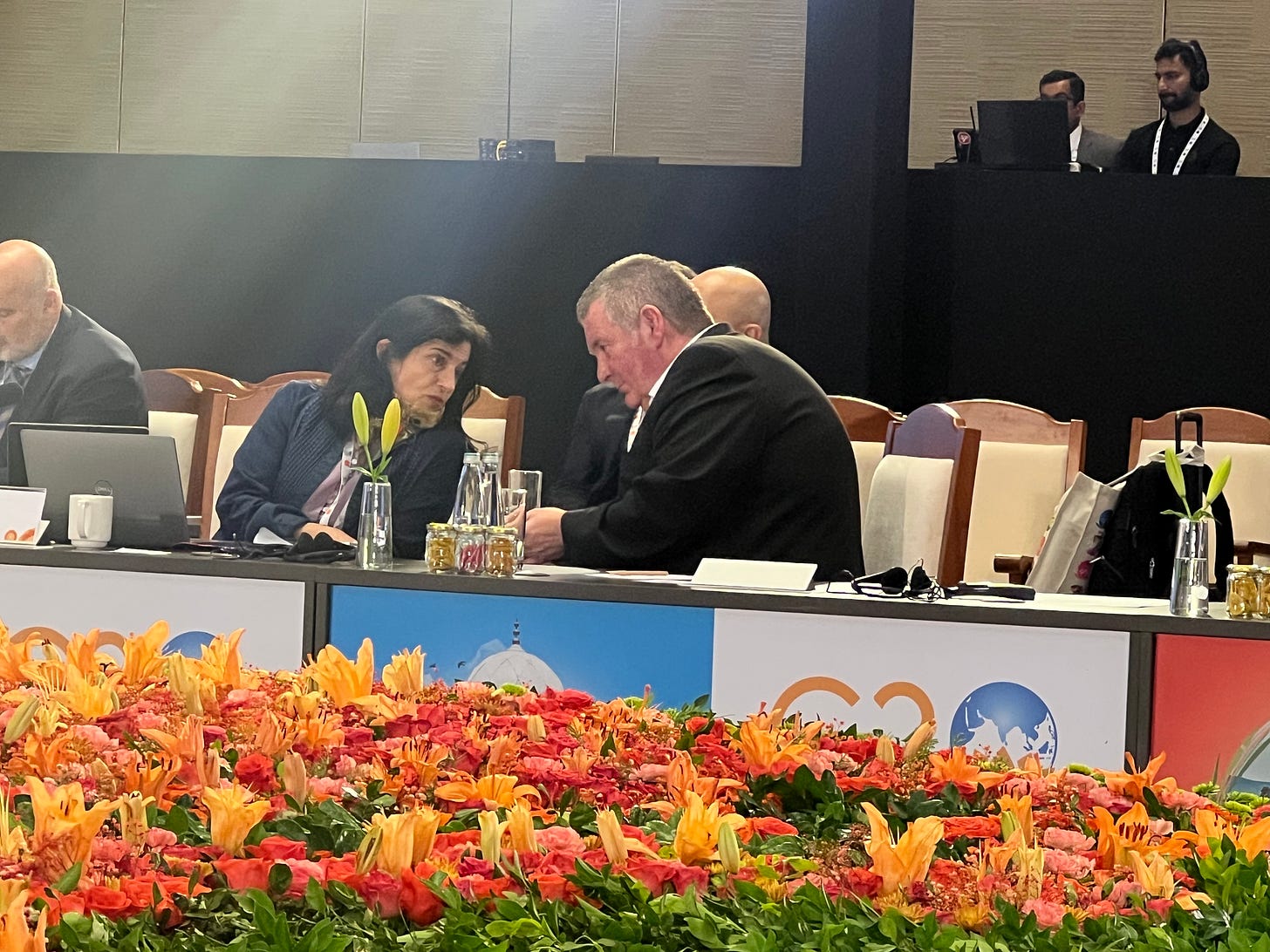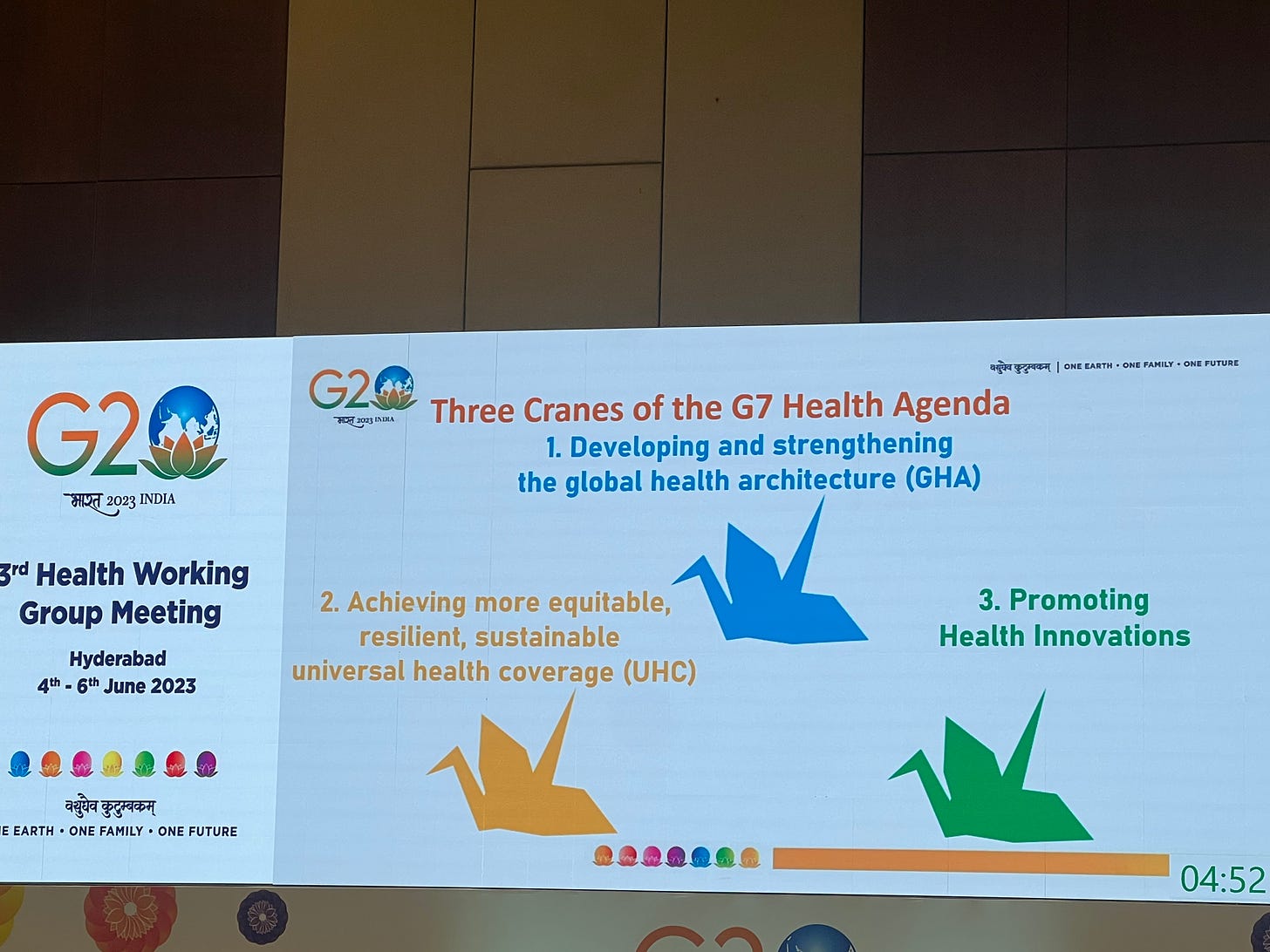In the past week in enchanting Hyderabad, the City of Pearls, I was reminded of the intricate process of pearl formation—a complex journey that mirrors the challenges we face in global health. Just as an irritant enters the soft tissue of a mollusk, initiating the pearl formation process, global health challenges have sparked the need for mechanisms to protect populations, especially the vulnerable. Like the gradual formation of a pearl- from a bit of sand that is an irritant-the creation of these complex mechanisms that are fit for purpose does not happen overnight. The process can be uncomfortable, further it requires years of dedication, collaboration, and solidarity. Our coming together in Hyderabad and on-going discussions are not dissimilar to the process of forming a gem, of enrichment and value to us all- in our case global health architecture and pandemic preparedness infrastructure to keep us all safe so we can shine like pearls.
Though my body may bear the weight of exhaustion from back-to-back meetings and arduous travel, the urgency of the moment breathes new life into my spirit. It propels me towards a cause dear to my heart—South-South platforms taking the lead and becoming indispensable negotiating partners in global health discussions.
I was invigorated to collaborate with fellow experts and advocates in crafting viable solutions to the distinctive challenges faced by the Global South here at the 3rd G20 Health Working Group discussions. Our aim is to ensure that our global south voices resonate powerfully on the global stage, as we address critical issues like the Pandemic Accord and pandemic prevention preparedness and response more widely. Hyderabad serves as a metaphor for the global health challenges we encounter. What may initially seem like an irritant can ultimately lead to remarkable outcomes if we are willing to put in the necessary work.
This week at G20 Working Group discussions, we heaved a collective sigh of relief as Dr Mike Ryan, Executive Director of the Health Emergencies Programme for WHO announced that the ACT-Accelerator will continue as the platform to coordinate the development, production and delivery of medical countermeasures whilst the Pandemic Treaty is being negotiated.
The Treaty process has set an ambitious deadline of a finalised text for consideration by Member States at the World Health Assembly in May 2024. I was heartened by the sense of collective action at the recent World Health Assembly and acknowledgement that ‘we the people’ are the world and international instruments such as the Pandemic Treaty should be designed by the people for the people. I hope the principle of reaching consensus for the Treaty of ‘nothing is agreed until everything is agreed’ will enable the southern voices and those of the most vulnerable to be heard in this process and not just those with commercial interests.
Yet, the timescales for consensus and approval, even with one year to go are tight. And this is why the announcement that ACT- A will continue as a platform for pandemic preparedness as we both prepare for disease X and the reemergence of known pathogens that threaten human health.
This significant announcement ensures there is no gap; just as each layer of nacre contributes to the formation of a pearl, it guarantees an uninterrupted continuum, leaving no room for a void—neither in operational nor institutional realms—should the world need to swiftly respond to any health emergency whilst the Pandemic Treaty is being negotiated and before a final instrument comes into effect.
On-going discussions with ACT-A partners including FIND, CEPI, GAVI, UNICEF, UNITAID, Wellcome, Bill and Melinda Gates Foundation, World Bank, the Global Fund and WHO, along with private sector founding partners IFPMA and DCVMN, civil society and regional bodies will enable us to glean invaluable insights from the tumultuous journey of COVID-19, and extend the consultation and collaborations with a view to providing Member States with the most refined frameworks within which longer term mechanisms tailored for future pandemic prevention, preparedness, and response can exist and thrive. The private sector, civil society and regional bodies are all critical partners to both the activities of ACT-A and the on-going discussions to negotiate a Pandemic Treaty. We must all be at the table to forge the best preparedness framework for health for all.
As a global community, we have already put in the hard yards, building relationships, norming and storming to create the processes and infrastructure that we have build around ACT-A to accelerate the development, production and delivery of medical countermeasures. We are continuing to learn as we build, and we are benefiting from the enormous set up costs which equate to time and money through a continuation of ACT-A. The painful lessons learned from the failures of our partnership to achieve equitable distribution of countermeasures will serve as a constant reminder to put people’s lives at the forefront of all our endeavours.
As WHO Special Envoy and Co-chair of ACT-A, I am profoundly honoured and privileged to collaborate with the esteemed partners of ACT-A on this journey of learning, and ensuring that lessons of the past are assimilated, leaving no gap for vulnerability in our preparedness efforts. Through this unwavering dedication, we endeavour to construct a robust, all-encompassing, and equitable architecture for pandemic prevention, preparedness, and response (PPPR).
As G20 President, India has an important role to play in stewarding these discussions as they move forward and ensuring southern voices are included as we broaden the tent and engage more widely and deeply on the best architecture of future preparedness.
In this pivotal moment, the world cannot merely pay lip service to the ideals of equity and inclusivity. The advocacy for participatory engagement in health decisions goes beyond a desire for tokenistic representation; it is a demand for justice. It demands that the individuals who possess the deepest insights into their unique circumstances play a central role in shaping decisions that will inevitably impact their lives, their loved ones, and their very livelihoods.
India, in its laudable pursuit of putting Global South voices at the heart of decision-making during its G20 Presidency year, plays a vital role in authentic and effective global South engagement. As part of the developing country troika, India's G20 Presidency focuses on three critical priorities: health emergencies prevention, preparedness, and response, with a particular emphasis on combatting anti-microbial resistance and adopting a comprehensive One Health framework.
Furthermore, India seeks to strengthen cooperation in the pharmaceutical sector, prioritising accessibility and availability of safe, effective, quality, and affordable medical countermeasures such as vaccines, therapeutics, and diagnostics. Additionally, digital health innovations and solutions are championed to bolster universal health coverage and enhance healthcare service delivery.
As negotiations continue toward a Pandemic Accord that works for all and not just for few, we must commit wholeheartedly to inclusive engagement and consultation, not solely within the G20, but with all Member State stakeholders. We must embrace the imperative of participatory engagement, understanding that it may require additional time to ensure that all voices are genuinely heard. Yet, in this unparalleled opportunity, we cannot afford to squander our chance to get it right this time.
Each time I am in India, I think of Africa. Africa stands to gain invaluable insights from India's achievements, particularly in healthcare, education, and technology. India's remarkable progress in these sectors, even amidst its own flaws and challenges, provides a blueprint for African nations. By embracing technology as a driver of development and investing in healthcare and education, Africa can address its own challenges, including high mortality rates, low life expectancy, lack of infrastructure and a lack of skilled labor.
Traversing the vibrant landscapes of India, it is impossible not to be captivated by the significant advancements achieved in recent years. India's path to success in technology, pharmaceuticals, medicine, and rural development —albeit with massive and observable challenges — is not a result of happenstance but of deliberate policies, investments in education and human capital, and a staunch focus on local innovation. India has harnessed the potential of its vast population, creating domestic markets, investing in local industries and technology, and fostering a culture of innovation and entrepreneurship.
By examining successful models of development and collaboration within countries that share common challenges, we can envision a future where a developed Global South thrives. India, currently holding the G20 presidency, serves as an exemplary case study, demonstrating the power of cooperation and inclusive growth. Through this lens, we explore the possibilities for other parts of the Global South, to learn from India's successes and chart its own path towards sustainable transformation. Let us apply these lessons to pandemic prevention, preparedness and response.
Just as the City of Pearls unveils its radiant treasures, let us uncover the wisdom and perspectives of the Global South. Together, let us forge a future where health decisions are made collectively, where justice and inclusivity prevail, and where the pearls of our collective wisdom illuminate the path to a healthier, more equitable world.









Excellent presentation Yodi, of the dangers that we face, as a united people against the destruction of our beloved planet. 👏🏿
Thank you.
Dieye-Tonye Willie-Harry (MSyl)
Beautiful and simple writing style... its much needed to reach a variety of audience... and I particularly apprecoate the positivity of the writeup🙏